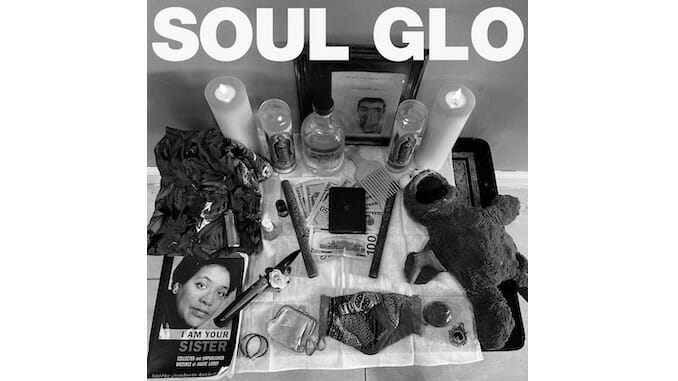On Diaspora Problems, Soul Glo Emerge as Hardcore’s Promised Future

Let’s get this out of the way early: TURNSTILE’s 2021 album GLOW ON was one of their genre’s biggest “we’ve made it” moments, launching that group into a sort of superstar stratosphere that few hardcore bands have achieved in the past 40 years. Well-deserved as it all was, their success also gave newer bands more visibility along the way as more people started to pay attention to what was happening in aggressive music. However, the new album by Philadelphia’s Soul Glo, Diaspora Problems, should be viewed as nothing short of a new tectonic shift in the world of hardcore punk.
Sure, this comparison only really holds water on the basis of broad genre similarities alone. TURNSTILE’s chill, major-chord sheen and crossover level-up primed them to be perfect bumper music for the ’22 Winter Olympics, with dazed hooks that made them the Euphoria generation’s favorite hardcore band. Listening to Diaspora Problems, you get the sense that Soul Glo are less concerned with getting the opportunity to perform a medley of new tunes on a prestigious late-night spot than hanging behind to dismantle the stale conventions of the often white male-dominated underground scene they cut their teeth in. And my goodness, do Soul Glo deliver. The rage contained within the 12 songs on Diaspora Problems is potent enough to launch anyone clinging to the status quo or softening of aggressive music out of an airlock into space to make way for a better tomorrow.
The album begins—as every great album should—with the sounds of a bong hit mimicking the wind-up drumbeat of the 20th Century Fox theme song. From there on, the album is a long exhale of thick smoke that can leave you dizzy and delirious when inhaled secondhand. The first song “Gold Chain Punk (Whogonnabeatmyass)” gives you a taste of the undeniable force of what’s to come. Singer Pierce Jordan shrieks and screams his vocals at the velocity of tumbling stones as the band—(now-former) guitarist Ruben Polo, bassist GG Guerra and drummer TJ Stevenson—constantly realigns itself with different time signatures and pummeling riffs.
As the song enters its final breakdown territory after two minutes of anthemic chords and shifts, Jordan—furious with the thought of explaining himself to anyone ever again—is ready for his last stand. “The unlimited worlds in this one Earth / Their work and its worth motivate my love of life undermined by / As it were / Feeling insecure,” he concludes, after feverishly trying to convey that it’s not the chain that he bought (and lost) that makes him. As it comes to a close over chunky beatdown riffs, Jordan is outside drunk with a Smith and Wesson in his pocket, welcoming anyone who wants to talk some more shit to show their faces. “Who gonna beat my ass?” he screams repeatedly, with his vocal cords shredded like damning evidence in the hands of an intern at a shady hedge fund.
The song contains as many musical ideas and rich narrative turns as a lesser band could fit into a single album. So where could they possibly go from there? Well, as it turns out, when you melt away the skin on somebody’s face, you can still find a higher setting on your blowtorch to make sure there is no trace of a head left behind.
-

-

-

-

-

-

-

-

-

-

-

-

-

-

-

-

-

-

-

-

-

-

-

-

-

-

-

-

-

-

-

-

-

-

-

-

-

-

-

-








































